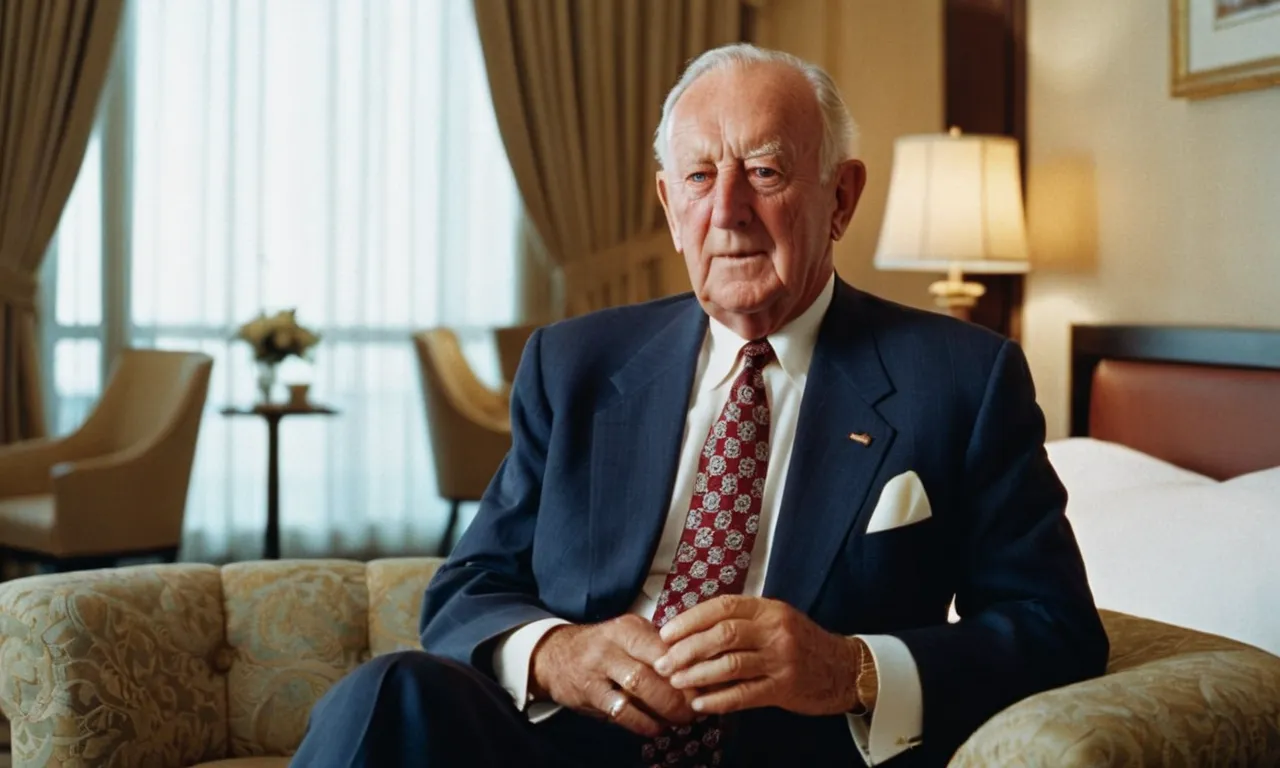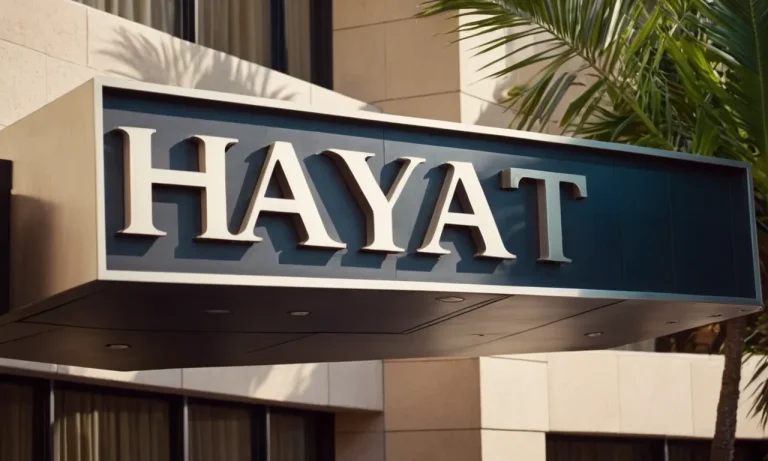Who Owns The Hilton Hotel Chain? A Comprehensive Guide
In the ever-evolving landscape of the hospitality industry, the Hilton Hotel chain stands as a towering giant, renowned for its luxurious accommodations and unwavering commitment to excellence. As one of the most recognizable names in the world of hotels, the question of who owns this iconic brand often piques the curiosity of travelers and industry enthusiasts alike.
If you’re short on time, here’s a quick answer to your question: The Hilton Hotel chain is owned by Hilton Worldwide Holdings Inc., a multinational hospitality company headquartered in McLean, Virginia, United States.
However, the story behind the ownership of this global hotel empire is far more intricate and fascinating. In this comprehensive article, we will delve into the rich history of the Hilton Hotel chain, explore its current ownership structure, and unravel the key players and events that have shaped its remarkable journey.
The Origins of the Hilton Hotel Chain
The Visionary Founder: Conrad Hilton
The story of the Hilton Hotel Chain begins with the visionary entrepreneur, Conrad Hilton. Born in 1887 in San Antonio, New Mexico, Hilton’s journey into the hospitality industry started humbly when he bought his first hotel, the Mobley Hotel, in 1919.
With an unwavering determination and an eye for opportunity, Hilton quickly understood the potential of the growing travel industry. He was a true pioneer, shaping the concept of modern hospitality with his innovative ideas and commitment to exceptional service.
The First Hilton Hotel
In 1925, Conrad Hilton opened the first hotel bearing his name – the Hilton Hotel in Dallas, Texas. This iconic property set the stage for Hilton’s vision of creating a nationwide chain of hotels that would provide consistent quality and service.
With its elegant design and state-of-the-art amenities, the Dallas Hilton quickly became a symbol of luxury and sophistication, attracting travelers from around the world. 😍
Expansion and Growth
Driven by his ambition and entrepreneurial spirit, Conrad Hilton embarked on an aggressive expansion strategy. By the late 1940s, the Hilton Hotel Chain had grown to include several hotels across the United States, including iconic properties such as the Stevens Hotel in Chicago and the Plaza Hotel in New York City.
This rapid growth was fueled by Hilton’s innovative approach to management, marketing, and customer service. 🎉
As the Hilton Hotel Chain continued to expand, it became a symbol of American hospitality and a benchmark for the industry. By the time of Conrad Hilton’s retirement in 1966, the company had grown to an impressive 188 hotels across 38 countries, with a total of over 35,000 rooms.
Today, the Hilton Hotel Chain is one of the largest and most recognized hospitality companies in the world, with over 6,900 properties across 122 countries and territories. 👏
The origins of the Hilton Hotel Chain are a testament to the power of vision, innovation, and perseverance. Conrad Hilton’s unwavering commitment to excellence and his ability to anticipate the needs of travelers laid the foundation for a hospitality empire that continues to inspire and delight guests from all corners of the globe.
Isn’t it amazing how a single person’s dream can transform an entire industry? 😊
The Blackstone Group’s Acquisition
In a landmark deal that shook the hospitality industry, the renowned private equity firm Blackstone Group acquired Hilton Hotels Corporation in 2007 for a staggering $26 billion, making it one of the largest leveraged buyouts in history.
This strategic move marked a pivotal turning point for the iconic hotel chain, paving the way for a comprehensive restructuring and rebranding initiative.
The Landmark Deal
The acquisition, orchestrated by Blackstone Group’s formidable team of financial experts, was a bold and ambitious undertaking. With a keen eye for untapped potential, Blackstone recognized the immense value and growth opportunities within the Hilton brand.
The deal was a testament to Blackstone’s unwavering confidence in the hospitality industry and its ability to unlock the full potential of the Hilton portfolio through strategic investments and operational excellence.
Restructuring and Rebranding
Following the acquisition, Blackstone embarked on an extensive restructuring and rebranding process, aimed at revitalizing the Hilton brand and positioning it for long-term success. This involved streamlining operations, optimizing cost structures, and implementing innovative strategies to enhance guest experiences.
The rebranding efforts focused on reinforcing Hilton’s reputation for exceptional service, luxurious accommodations, and a commitment to sustainability. According to Hilton’s corporate website, the company has achieved impressive milestones, such as reducing carbon emissions by 30% and water consumption by 20% across its portfolio.
Hilton Worldwide Holdings Inc.
In 2013, Blackstone took Hilton public by forming Hilton Worldwide Holdings Inc., a move that further solidified the company’s position in the global hospitality market. The initial public offering (IPO) was a resounding success, raising over $2.3 billion and valuing the company at a staggering $21 billion.
Today, Hilton Worldwide Holdings Inc. operates a diverse portfolio of 18 world-class brands spanning more than 6,800 properties across 122 countries and territories, according to the company’s investor relations website.
With a continued focus on innovation, sustainability, and guest satisfaction, Hilton remains a leader in the hospitality industry, thanks in part to Blackstone’s strategic acquisition and subsequent transformative efforts.
Key Players and Ownership Structure
Major Shareholders and Investors
Hilton Hotels Corporation is a publicly-traded company, with its shares listed on the New York Stock Exchange under the symbol “HLT”. The company’s largest shareholders include institutional investors such as the Blackstone Group, which held a significant stake after acquiring Hilton in 2007.
Other major investors include Pershing Square Capital Management, led by activist investor Bill Ackman, and Wellington Management Company. As of 2022, the Hilton family, descendants of the company’s founder Conrad Hilton, collectively owns around 24% of the company’s shares, making them the largest individual stakeholders.
This ownership structure reflects the company’s strong ties to its legacy while also embracing the involvement of institutional investors.
Board of Directors and Executive Leadership
Hilton’s Board of Directors is responsible for overseeing the company’s strategic direction and ensuring effective governance. The board is currently chaired by Melanie L. Healey, who has been a director since 2017.
The board comprises a diverse group of experienced professionals from various industries, including hospitality, finance, and technology. Hilton’s executive leadership team is led by President and CEO Christopher J. Nassetta, who has been at the helm since 2007.
The executive team is responsible for driving the company’s operations, growth, and innovation initiatives. Under Nassetta’s leadership, Hilton has expanded its global footprint and introduced innovative programs like the Hilton Honors guest loyalty program, which has over 137 million members as of 2023 😎.
Hilton’s Global Footprint
Hilton is a true global powerhouse in the hospitality industry, with an impressive footprint spanning 122 countries and territories. As of 2023, the company boasts a portfolio of 18 world-class brands, including iconic names like Hilton Hotels & Resorts, Waldorf Astoria, and DoubleTree by Hilton.
With over 7,000 properties and nearly 1.2 million rooms, Hilton caters to a diverse range of travelers, from luxury seekers to budget-conscious guests. The company’s global presence is a testament to its successful expansion strategy and commitment to delivering exceptional hospitality experiences worldwide.
Check out Hilton’s corporate website to explore their impressive global footprint in detail.
The Future of Hilton Hotels
Expansion Plans and Growth Strategies
Hilton Hotels, the global hospitality giant, has ambitious plans to expand its footprint across the world. The company aims to open hundreds of new properties in the coming years, with a focus on emerging markets and untapped regions.
This growth strategy is fueled by the rising demand for quality accommodations from both leisure and business travelers. According to Hilton’s latest financial report, the company plans to add over 1,000 hotels to its portfolio by 2025, representing a significant increase in its global presence.
Hilton’s expansion efforts are not limited to new hotel openings; the company is also exploring opportunities for strategic acquisitions and partnerships. By acquiring or collaborating with other hospitality brands, Hilton can diversify its offerings and cater to a wider range of customer preferences.
This approach not only strengthens Hilton’s market position but also allows for cross-brand synergies and operational efficiencies.
Sustainability and Corporate Social Responsibility
As the world becomes increasingly conscious of environmental and social issues, Hilton Hotels has embraced sustainability and corporate social responsibility (CSR) as integral parts of its future strategy.
The company recognizes the importance of reducing its carbon footprint and minimizing its environmental impact. Hilton has implemented various initiatives, such as energy-efficient technologies, water conservation measures, and waste reduction programs, across its properties worldwide.
Furthermore, Hilton is committed to supporting local communities and promoting responsible tourism. Through its Travel with Purpose program, the company focuses on creating opportunities for employment, entrepreneurship, and education in the regions where it operates.
By fostering positive relationships with local stakeholders and contributing to sustainable development, Hilton aims to create a lasting positive impact on the destinations it serves.
Embracing Innovation and Technology
In the ever-evolving hospitality industry, Hilton Hotels understands the importance of staying ahead of the curve by embracing innovation and leveraging cutting-edge technologies. The company has invested heavily in digital platforms and mobile applications to enhance the guest experience and streamline operations.
From mobile check-in and keyless entry systems to personalized room controls and virtual concierge services, Hilton is leveraging technology to provide seamless and convenient experiences for its guests.
Additionally, Hilton is exploring the potential of emerging technologies such as artificial intelligence (AI), virtual reality (VR), and the Internet of Things (IoT) to revolutionize various aspects of the hospitality industry.
By partnering with innovative startups and technology companies, Hilton aims to stay at the forefront of industry trends and deliver exceptional service to its customers. As the world continues to evolve, Hilton Hotels is well-positioned to embrace the future with its forward-thinking strategies, commitment to sustainability, and dedication to innovation.
Conclusion
The Hilton Hotel chain’s ownership story is a captivating tale of vision, perseverance, and strategic business acumen. From its humble beginnings as a single hotel in Cisco, Texas, to its current status as a global hospitality powerhouse, the Hilton brand has weathered numerous challenges and undergone transformative changes.
Today, Hilton Worldwide Holdings Inc., backed by a consortium of investors and guided by a seasoned leadership team, steers the course of this iconic hotel chain. With a steadfast commitment to excellence, innovation, and sustainable growth, the future of Hilton Hotels promises to be as remarkable as its storied past.
Whether you’re a frequent traveler, a hospitality industry professional, or simply someone with a keen interest in the world of hotels, understanding the ownership and history of the Hilton Hotel chain offers valuable insights into the dynamics of the global hospitality landscape.
As the world continues to evolve, one thing remains certain: the Hilton name will continue to be synonymous with luxury, service, and unforgettable experiences for generations to come.








